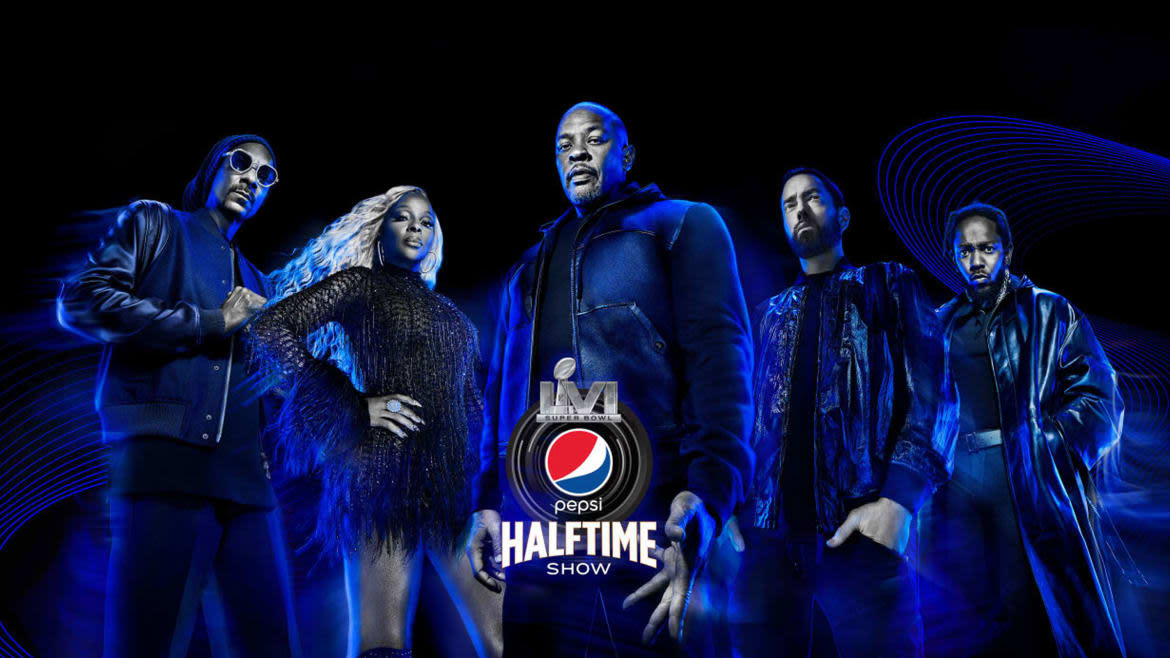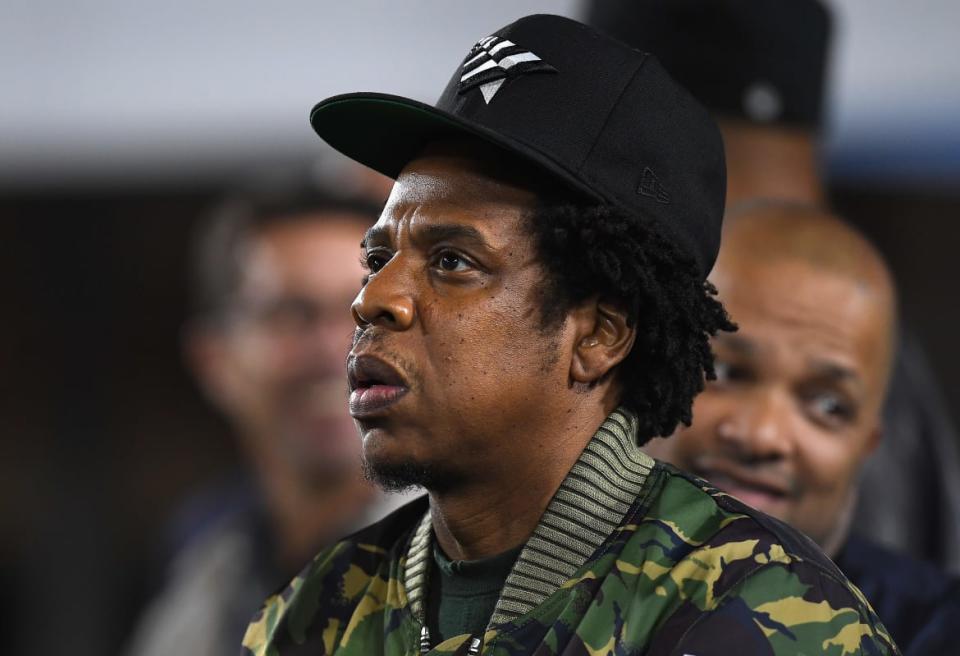Don’t Be Fooled by Jay-Z’s Star-Studded Super Bowl Halftime Show

- Oops!Something went wrong.Please try again later.
- Oops!Something went wrong.Please try again later.
- Oops!Something went wrong.Please try again later.
- Oops!Something went wrong.Please try again later.
- Oops!Something went wrong.Please try again later.
After two consecutive years of white, male headliners at the Super Bowl Halftime Show proved to be one too many, the nation’s biggest televised musical event has received a bit of a facelift over the past few years thanks to a partnership with Jay-Z and Roc Nation that, so far, has delivered a much-celebrated collaboration between Shakira and Jennifer Lopez and a slightly more divisive performance by The Weeknd. In 2022, the NFL, Roc Nation and the show’s sponsor Pepsi will continue their agenda of platforming people of color and women with an illustrious, majority-Black lineup featuring legendary hip-hop and R&B acts Dr. Dre, Kendrick Lamar, Mary J. Blige, Snoop Dogg, and Eminem—a gathering of heavy hitters that is sure to be one for the pop-culture history books and maybe the biggest national moment for hip-hop to date.
At a time when innocuous rap music videos incite weeklong, brain-melting culture wars between the right and the left, one can easily visualize the combative morning-after takes this event will inevitably spur on social media and in the news. Right-wing commentators like Ben Shapiro, Candace Owens, and Tucker Carlson will get on their racist soapboxes to denounce the NFL for “promoting gangster culture” and attempt to label the undoubtedly censored lyrical content unsuitable for children. Presuming that the artists will likely make some sort of political gesture toward racial equality, as Black musicians have historically been known to do—but especially in the past two years since the murders of George Floyd and Breonna Taylor—these pundits will also be spewing their typical anti-Black Lives Matter sentiments. Meanwhile, liberals on CNN, MSNBC and Twitter who enjoy clapping back at right-wingers will spend the ensuing days defending the genre of hip-hop.
Basquiat’s Close Friends and Collaborators Speak Out Against Jay-Z and Beyoncé’s Tiffany’s Ad
Jay-Z and the slate of performers will receive some good PR and inevitably come out victorious, as supporting Black art, businesses, and people (at least rhetorically) and appearing anti-racist has suddenly become in vogue in the corporate world and for politicians in the Trump era. Unfortunately, the show and whatever level of media frenzy that follows will conveniently overshadow the nefarious issues at the core of the NFL and their treatment of Black players that led to the rapper-entrepreneur’s recruitment in the first place.
Folks who follow the business maneuvers of hip-hop’s first billionaire will recall that he was hired by the NFL at the end of 2019 to advise NFL performances and aid social justice efforts for the association and its newly launched Inspire Change initiative. It was the same year certain celebrities and social media users announced boycotts of that year’s Super Bowl—and some musicians revealed that they had turned down the offer to perform—over accusations by former San Francisco 49ers quarterback Colin Kaepernick that he was blackballed from the league for his highly scrutinized protests during the national anthem. At the time, the announcement of this deal resulted in a wave of backlash and accusations that the rapper—who previously boasted that he “said no to the Super Bowl” in solidarity with Kaepernick on his 2018 song “Apeshit” with his wife Beyoncé—was a sellout. His ill-informed remarks about what he perceived as a lack of effectiveness in Kaepernick’s form of protest and what he considered true “action” toward racial equality sparked even more outrage.
About his decision to partner with the league, he said, “I’m really into action. I’m into real work. I’m not into how it looks. How it looks only lasts for a couple months until we start doing the work.”

Rapper Jay-Z attends the game between the Kansas City Chiefs and the Los Angeles Rams at Los Angeles Memorial Coliseum on November 19, 2018, in Los Angeles, California.
He also added, “Inspire Change is already happening (with Roc Nation) and the NFL has a huge platform. We can use that huge platform, and we’ve seen it happen. Like with J.J. Watt, when he brought the aid to everyone in Houston, everybody forgot about the turmoil that was in the NFL. If you can use this platform to do that in different areas, that’s a home run. That’s how I would view a success. That’s success for me.”
It’s an easily detestable take from someone who was evidently hired to rehabilitate the organization’s image and even applauds one of its athletes for distracting the public from the league’s internal problems. What’s even more ludicrous about Jay-Z’s claim that he’s not interested in “how things look” is that, throughout his career, he’s falsely equated representation in white capitalist spaces and positions of power and ownership, even at the expense of other Black people, with the liberation of Black people as a whole. Furthermore, he, like many Black elites only marginally interested in social equality, enjoys touting the myth that oppressive institutions can be transformed from the inside with the inclusion of a privileged few, which consistently results in those participants mimicking the behavior of their oppressors and said institutions getting to boast of their diversity. Suffice to say, Jay-Z’s eagerness to play Black spokesperson for the league while Kaepernick will conceivably never play again, and after using his name to gain cred in progressive circles (like all of the rappers performing in the upcoming Halftime Show), serves as a stark reminder that capitalists will always operate in their own interest first.
But beyond Kaepernick and the way the league suppresses Black voices, it’s even more abhorrent that the league has decided to host this major moment in Black culture as retired Black players and their families await compensation and medical benefits from a 2013 class-action lawsuit against the NFL for neurological injuries. The players allege that the league’s use of “race-norming” in its cognitive tests have prohibited Black players from being properly diagnosed and receiving payouts. The league’s long-overdue removal of “race-norming” from its medical protocol—although they maintain that it affected the players’ claims—has hardly put a seal on the issue, as the court-ordered mediation between former players and the NFL is still ongoing and more families are coming forward with stories of the league’s medical racism after the lawsuit raised national awareness about the racist practice, which assumes Black people have lower cognitive function than white people.
But multi-billion dollar corporations and billionaires like Jay-Z know how to weaponize celebrity power better than anyone and understand how “ground-breaking” representation can detract spectators and marginalized people, who have been taught to expect nothing more than that, from the nefarious matters that are actually impacting people’s livelihoods. In that way, the NFL’s star-studded celebration of hip-hop, even with a noted abuser front and center, will most likely succeed as an effective Band-Aid for the association as they continue to cause harm to their Black employees.
Get our top stories in your inbox every day. Sign up now!
Daily Beast Membership: Beast Inside goes deeper on the stories that matter to you. Learn more.

